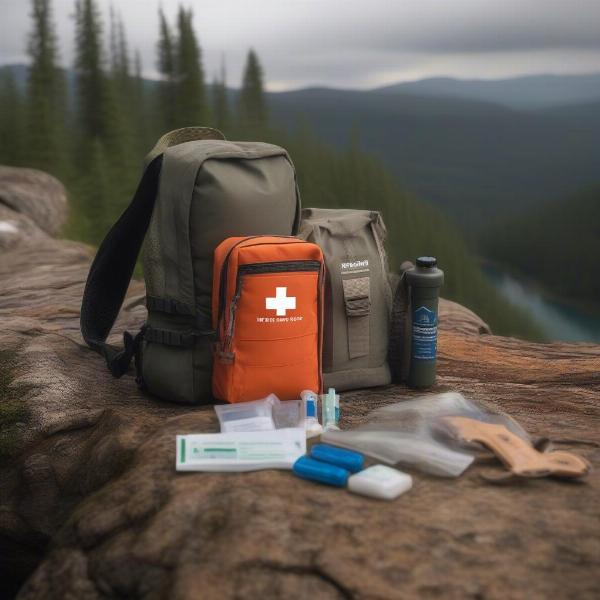A hunting dog is more than just a pet; they’re a trusted partner and an invaluable asset in the field. Ensuring their safety and well-being is paramount, and a well-stocked hunting dog medical kit is crucial for addressing any injuries or ailments that may arise during a hunt. This comprehensive guide will equip you with the knowledge and resources to create a hunting dog medical kit tailored to your canine companion’s needs, providing peace of mind and enabling you to react swiftly and effectively in emergency situations.
Building the Perfect Hunting Dog Medical Kit: Essential Items
A comprehensive medical kit should be a staple in every hunter’s gear. It’s not just about treating minor cuts and scrapes; it’s about being prepared for any eventuality. Consider these essential items for your hunting dog’s medical kit:
- Wound Care: Antiseptic wipes or solution, sterile gauze pads, adhesive tape, cotton swabs, styptic powder to stop bleeding, and a pair of blunt-tipped scissors to cut away fur around wounds. These items are crucial for cleaning and dressing injuries promptly.
- Splinting Materials: A flexible splint or rolled-up magazine secured with vet wrap can provide temporary support for sprains or fractures. Remember, prompt veterinary attention is crucial for proper diagnosis and treatment.
- Medications: Consult your veterinarian about including pain relievers and anti-inflammatory medications specifically formulated for dogs in your kit. Never administer human medications to your dog.
- Other Essentials: Tweezers for removing thorns or splinters, a tick removal tool, a rectal thermometer, a muzzle (for the dog’s safety and yours if they’re in pain), eye wash solution, and an emergency blanket for warmth and shock management.
Addressing Common Hunting Dog Injuries: A Practical Guide
Hunting dogs are prone to specific injuries due to the nature of their activities. Knowing how to address these common issues can make a significant difference while awaiting veterinary care.
- Lacerations: Clean the wound thoroughly with antiseptic wipes and apply a sterile dressing. For deep cuts, control bleeding with direct pressure.
- Sprains/Strains: Restrict your dog’s movement and apply a cold compress. A temporary splint can provide stability.
- Heatstroke: Move your dog to a shaded area and apply cool water to their body, focusing on the paws and groin. Offer small amounts of cool water to drink.
What if my hunting dog ingests something toxic in the field?
If your hunting dog ingests a toxic substance, immediately contact your veterinarian or a pet poison control center. Having information about the potential toxin can be extremely helpful.
How can I make my hunting dog’s first aid kit travel-friendly?
Organize your kit in a waterproof, durable container and keep it easily accessible. Consider a smaller, lightweight version for day trips.
 Travel-Friendly Dog First Aid Kit
Travel-Friendly Dog First Aid Kit
Conclusion: Prioritizing Your Hunting Partner’s Well-being
A well-stocked hunting dog medical kit is an indispensable tool for any responsible hunter. By preparing for potential emergencies, you’re demonstrating a commitment to your canine companion’s safety and well-being. Remember, prompt and appropriate first aid can make a significant difference in your dog’s recovery and ensure many more successful hunts together. Regularly check and replenish your hunting dog medical kit to maintain its effectiveness.
FAQ:
- What is the most important item in a hunting dog medical kit? A styptic powder or pencil for stopping bleeding.
- Should I include any human medications in my dog’s kit? No, always use medications specifically formulated for dogs.
- How often should I check my hunting dog medical kit? At least once per hunting season or more frequently if items are used.
- Where should I store my dog’s medical kit during a hunt? In an easily accessible, waterproof location.
- What’s the difference between a hunting dog medical kit and a regular pet first aid kit? A hunting dog medical kit often includes items specific to field injuries like splints and wound irrigation solutions.
- Can I use hydrogen peroxide to clean my dog’s wounds? It’s best to use an antiseptic specifically designed for pets as hydrogen peroxide can damage tissue.
- What should I do if my dog suffers a serious injury in the field? Provide first aid and immediately seek veterinary attention.
ILM Dog is your trusted resource for expert advice on all aspects of dog care, from breed selection to health, training, and nutrition. We’re dedicated to providing practical, evidence-based information to help dog owners worldwide provide the best possible care for their canine companions. Whether you’re a seasoned hunter or a new dog owner, ILM Dog offers a wealth of resources to enhance your dog’s well-being and strengthen your bond. Contact us for personalized guidance and support: Email: [email protected], Phone: +44 20-3965-8624. Visit ILM Dog today for all your dog care needs.